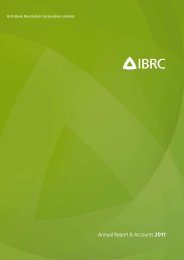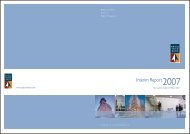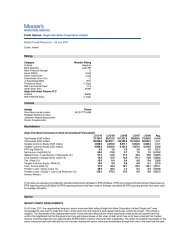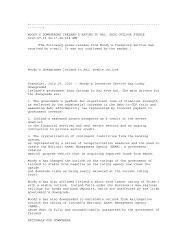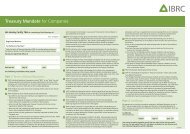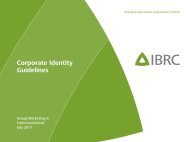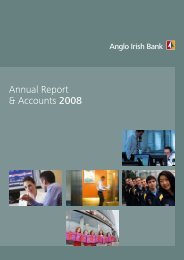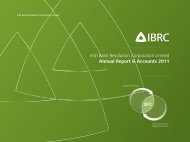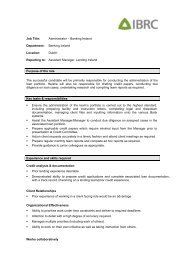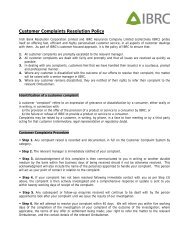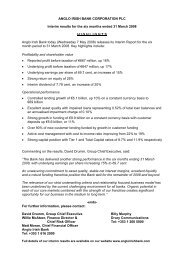Annual Report & Accounts 2009 - Anglo Irish Bank
Annual Report & Accounts 2009 - Anglo Irish Bank
Annual Report & Accounts 2009 - Anglo Irish Bank
You also want an ePaper? Increase the reach of your titles
YUMPU automatically turns print PDFs into web optimized ePapers that Google loves.
Credit risk<br />
Credit risk is the risk of suffering financial loss, should any<br />
of the Group’s customers or counterparties fail to fulfil their<br />
contractual obligations to the Group. The principal credit risk<br />
that the Group faces arises mainly from loans and advances to<br />
customers.<br />
Adverse changes in the credit quality of the Group’s<br />
borrowers, counterparties and their guarantors, and adverse<br />
changes arising from the general deterioration in global<br />
economic conditions, have reduced the recoverability of<br />
the Group’s loan assets and have increased the quantum of<br />
impaired loans and impairment charges during the period.<br />
The Group has exposures to a range of customers in<br />
different geographies, including exposures to investors in,<br />
and developers of, commercial and residential property.<br />
Property prices have shown significant declines throughout<br />
the last year and developers of commercial and residential<br />
property are facing particularly challenging market conditions,<br />
including substantially lower prices and volumes. In addition,<br />
the Group’s exposure to credit risk is exacerbated when the<br />
collateral it holds cannot be realised or is liquidated at prices<br />
that are not sufficient to recover the full amount of the<br />
loan, which is most likely to occur during periods of illiquidity<br />
and depressed asset valuations, such as those currently<br />
being experienced.<br />
The Group’s asset quality deteriorated significantly in the<br />
15 months to 31 December <strong>2009</strong>. Property markets were<br />
severely impacted by a lack of confidence and liquidity which<br />
has led to a significant reduction in property values across<br />
all of the <strong>Bank</strong>’s markets. This, together with an extremely<br />
difficult operating environment in the Group’s markets,<br />
particularly in Ireland, and the rapid erosion of the Group’s<br />
clients’ net worth has resulted in a substantial deterioration<br />
in the asset quality of the <strong>Bank</strong>’s loan book.<br />
There is continuing uncertainty surrounding the depth<br />
of the slowdown in the global economy and the direction<br />
of property markets. While there are signs that the global<br />
economic downturn is bottoming out, any recovery is<br />
expected to be slow. In particular, as a result of Ireland’s<br />
significant reliance on the construction industry, the recovery<br />
is expected to lag behind that of the wider European Union.<br />
Operational risk<br />
<strong>Anglo</strong> <strong>Irish</strong> <strong>Bank</strong><br />
<strong>Annual</strong> <strong>Report</strong> & <strong>Accounts</strong> <strong>2009</strong><br />
Operational risk is the risk of loss arising from inadequate<br />
controls and procedures, unauthorised activities, outsourcing,<br />
human error, systems failure and business continuity.<br />
Operational risk is inherent in every business organisation and<br />
covers a wide spectrum of issues. The Group’s management<br />
of its exposure to operational risk is governed by a policy<br />
prepared by Group Risk Management and approved by the<br />
Risk and Compliance Committee.<br />
Capital and regulatory<br />
compliance risk<br />
Capital risk is the risk that the Group has insufficient<br />
capital resources to meet its minimum regulatory capital<br />
requirements. Regulatory compliance risk arises from a failure<br />
or inability to comply fully with the laws, regulations or codes<br />
applicable specifically to the financial services industry.<br />
Changes in government policy, legislation or regulatory<br />
interpretation applying to the financial services industry<br />
may adversely affect the Group’s capital requirements and,<br />
consequently, reported results and financing requirements.<br />
These changes include possible amendments to government<br />
and regulatory policies and solvency and capital requirements.<br />
The Group’s ability to maintain its targeted regulatory capital<br />
ratios could be affected by a number of factors, including<br />
the price NAMA will pay for the portfolio of loans to be<br />
transferred, the level of risk weighted assets and the credit<br />
quality of the Group’s loan portfolio following the NAMA<br />
transfer. Non-compliance with capital and other regulatory<br />
requirements could lead to fines, public reprimands, damage<br />
to reputation, enforced suspension of operations or, in<br />
extreme cases, withdrawal of authorisations to operate. If<br />
the Group is required to strengthen its capital position it will<br />
necessitate further capital contributions by its Shareholder.<br />
As a result of the losses incurred during the period there has<br />
been a significant deterioration in the <strong>Bank</strong>’s regulatory capital<br />
base. The Minister for Finance, having acknowledged the<br />
Group’s systemic importance to the <strong>Irish</strong> economy, has taken<br />
a number of measures to ensure the <strong>Bank</strong> is appropriately<br />
capitalised. The Shareholder provided €4 billion in capital<br />
between June and September <strong>2009</strong>. A liability management<br />
25



